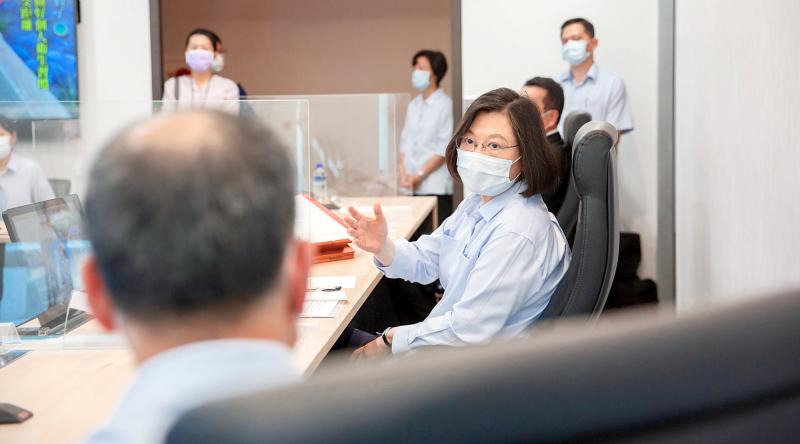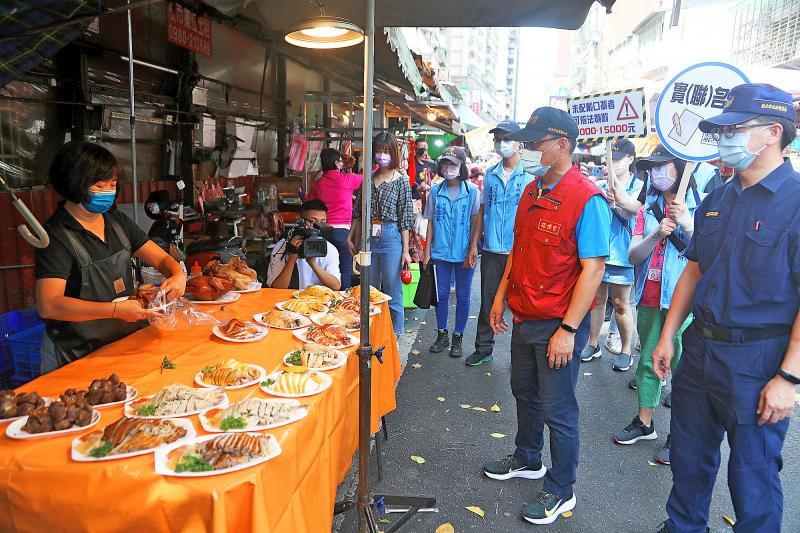People confirmed to have COVID-19 should be sent to a hospital or centralized quarantine facility within six hours of receiving notice of their positive test result, the Central Epidemic Command Center (CECC) said yesterday.
Deputy Minister of the Interior Chen Tsung-yen (陳宗彥), who is deputy commander of the center, made the remarks at a morning news conference in Taipei following the CECC’s first daily National Epidemic Prevention Meeting with city and county government officials.
The CECC and local governments reached an agreement on a set of actions at the first meeting, Chen said.

Photo courtesy of the Presidential Office via CNA
Local governments have been asked to identify COVID-19 hot spots and set up testing sites there, Chen said, adding that they would report their findings to the center, which would help with evaluation and assistance.
Meanwhile, the CECC would provide local governments with standards for testing, sending patients to treatment facilities, diagnostic procedures and the establishment of centralized quarantine facilities, he said.
The standards include requiring local governments to send people confirmed to have COVID-19 to a centralized quarantine facility or a hospital within six hours of receiving their positive test results, he said.

Photo: CNA
Local governments should also notify the center if there are supply shortages, Chen said, adding that the Ministry of Health and Welfare would be responsible for coordinating and distributing medical resources across the nation.
The CECC on Sunday authorized local governments to publish the activity history of confirmed cases, he said, adding that the center would help integrate contact tracing information across regions for local governments’ reference.
Lastly, frontline medical staff would be given priority access to COVID-19 vaccines, Chen said.
The daily National Epidemic Prevention Meetings aim to help integrate resources, examine the progress made on disease prevention measures and dispel false information, he said.
News briefings after the meetings are to be held daily in the morning, in addition to the CECC’s daily news conference at about 2pm.
Separately, President Tsai Ing-wen (蔡英文) yesterday inspected the National Armed Forces Epidemic Command Center on the first anniversary of her second inauguration.
After hearing a report about its work, Tsai instructed the command center to put its whole weight behind fighting the COVID-19 pandemic.
There must be nationwide consistency; no city or county can be omitted, she said.
This includes cooperation with the Chemical Corps for sanitization, Tri-Service General Hospital for testing personnel and the Armaments Bureau for preparing quarantine centers, she added.
Despite Taiwan being fully focused on the pandemic, Tsai said that combat-readiness preparations have not stopped.
Chinese aircraft and ships are continuing to encroach, she said, instructing the military to continue closely monitoring the nation’s sea and airspace.
Tsai reiterated that maintaining health means maintaining military strength.
Vaccines are open to military personnel, she said, urging health authorities to arrange for vaccinations as soon as possible.
A nationwide level 3 COVID-19 alert is in effect until Friday next week.

Palauan President Surangel Whipps Jr arrived in Taiwan last night to kick off his first visit to the country since beginning his second term earlier this year. After arriving at Taoyuan International Airport at around 6:30 pm, Whipps and his delegation were welcomed by Minister of Foreign Affairs Lin Chia-lung (林佳龍). Speaking to gathered media, the Palauan leader said he was excited and honored to be back in Taiwan on his first state visit to Taiwan since he was sworn in this January. Among those traveling with Whipps is Minister of State Gustav N. Aitaro, Public Infrastructure

President William Lai (賴清德) yesterday thanked Palau for its continued support of Taiwan's international participation, as Taipei was once again excluded from the World Health Assembly (WHA) currently taking place in Switzerland. "Palau has never stopped voicing support for Taiwan" in the UN General Assembly, the WHO and other UN-affiliated agencies, Lai said during a bilateral meeting with visiting Palau President Surangel Whipps Jr. "We have been profoundly touched by these endorsements," Lai said, praising the Pacific island nation's firm support as "courageous." Lai's remarks came as Taiwan was excluded for the ninth consecutive year from the WHA, which is being held in

RESOLUTIONS DEBATE: Taiwan’s allies said that UN and WHA resolutions cited by China and other nations ‘do not determine Taiwan’s participation in WHO activities’ A proposal to invite Taiwan to this year’s World Health Assembly (WHA) was rejected on Monday, resulting in Taipei’s absence from the annual meeting for a ninth consecutive year, although partners spoke up for Taiwan’s participation at the first day of the meeting. The first agenda item after the opening was a “two-on-two debate” on a proposal to invite Taiwan to participate at the WHA as an observer. Similar to previous years, two countries made statements in favor of the proposal, while two others expressed their opposition. Philippine Secretary of Health Teodoro Herbosa, president of the 78th WHA, accepted the WHA General Committee’s

At least three people died and more than a dozen were injured yesterday afternoon when a vehicle struck a group of pedestrians in New Taipei City’s Sansia District (三峽). The incident happened at about 4pm when a car rammed into pedestrians at an intersection near Bei Da Elementary School. Witnesses said the sedan, being driven at a high speed, ran a red light, knocking scooters out of the way and hitting students crossing the road before careening into a median near the intersection of Guocheng and Guoguang streets. The incident resulted in three deaths and 13 injuries, including the driver, a 78-year-old man